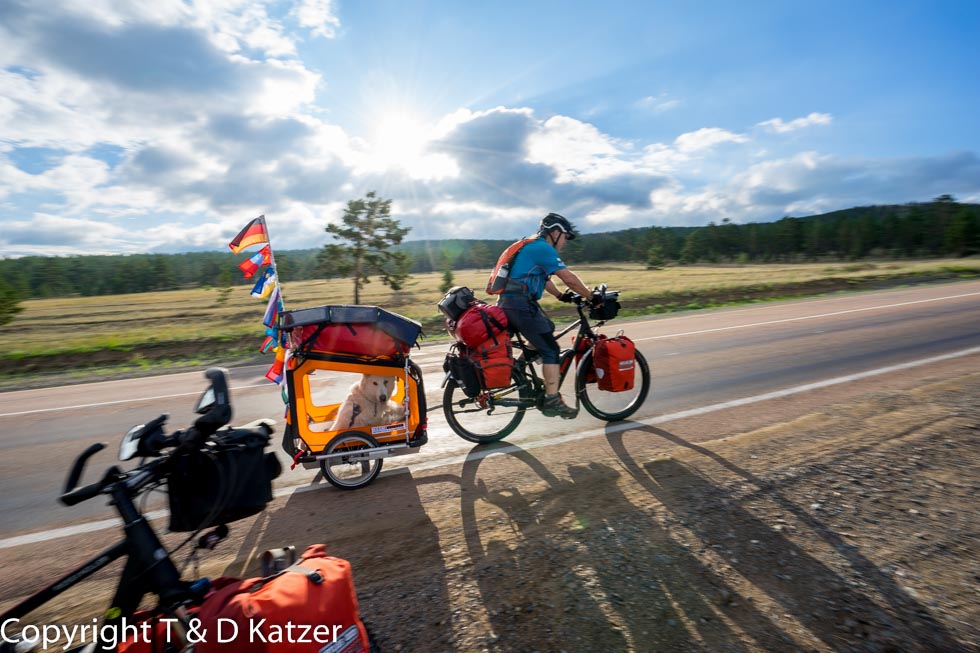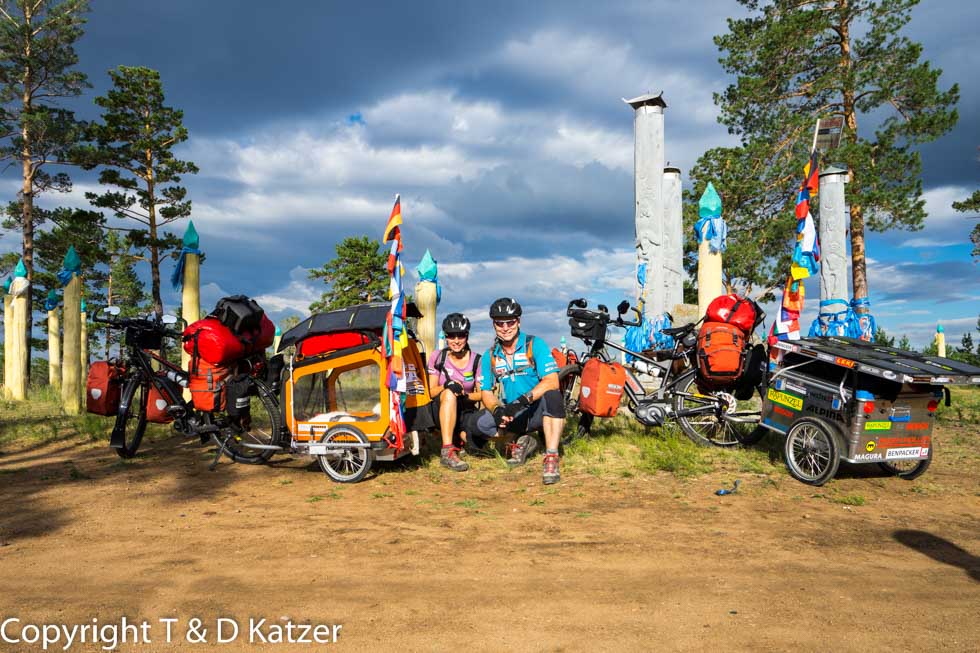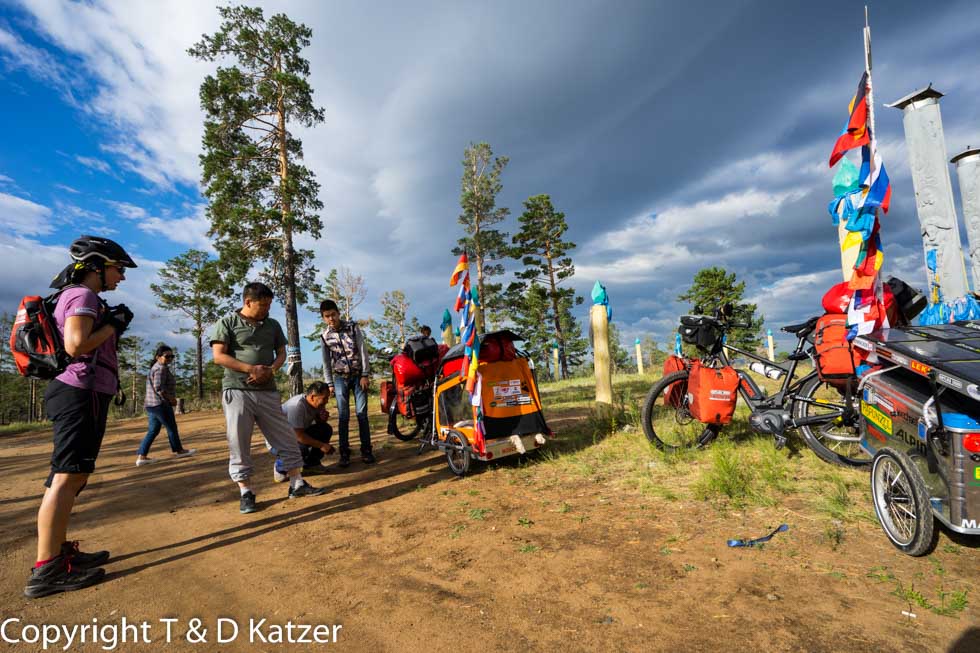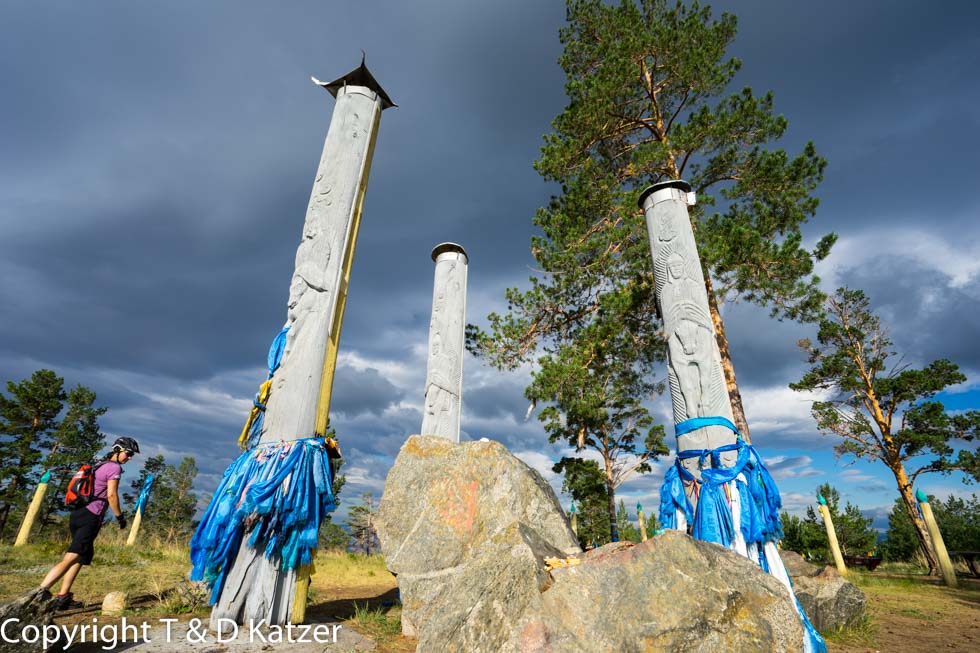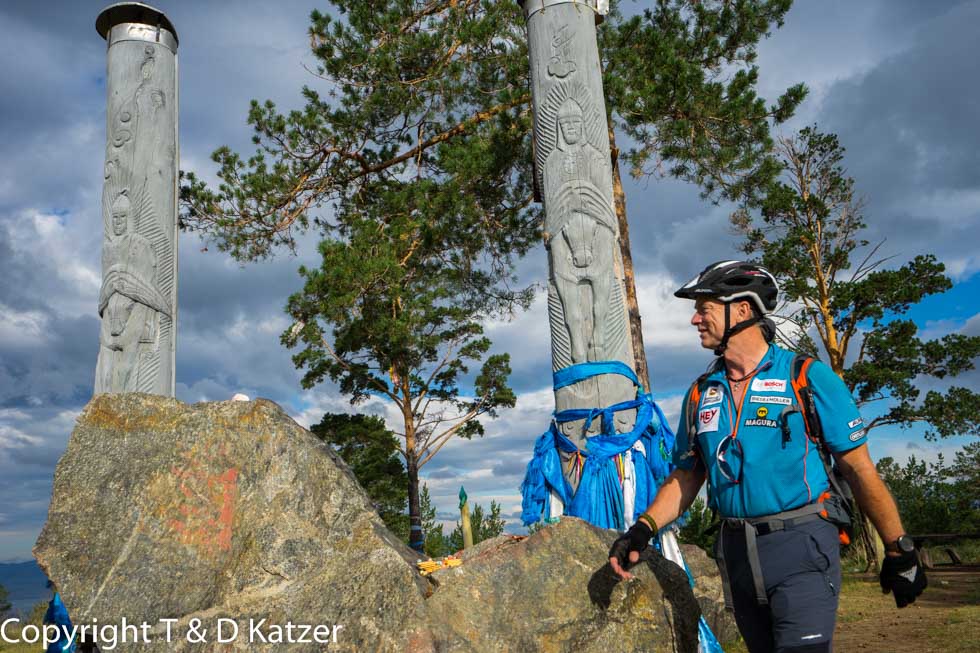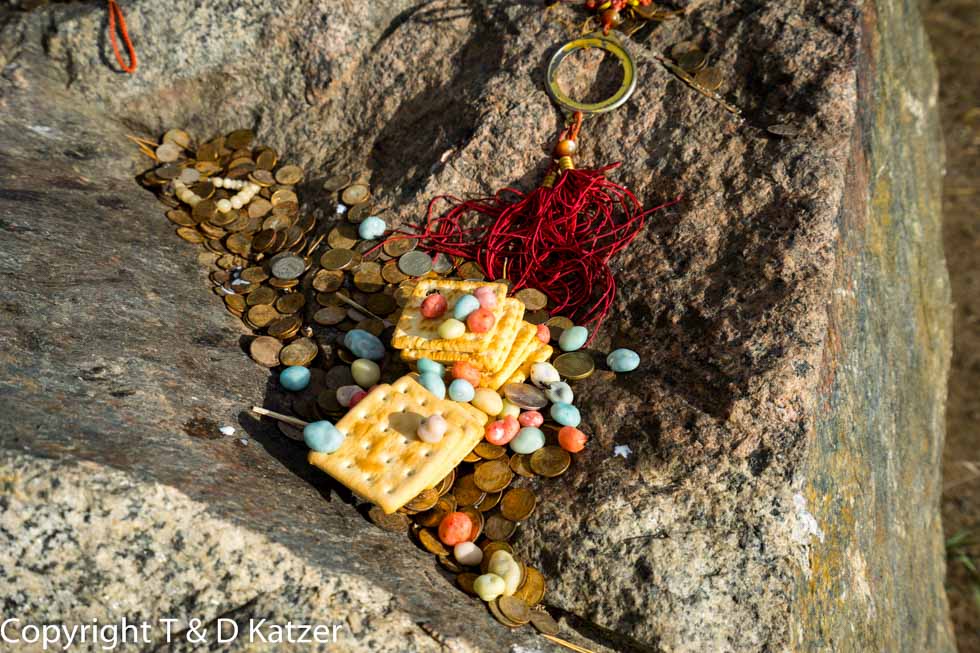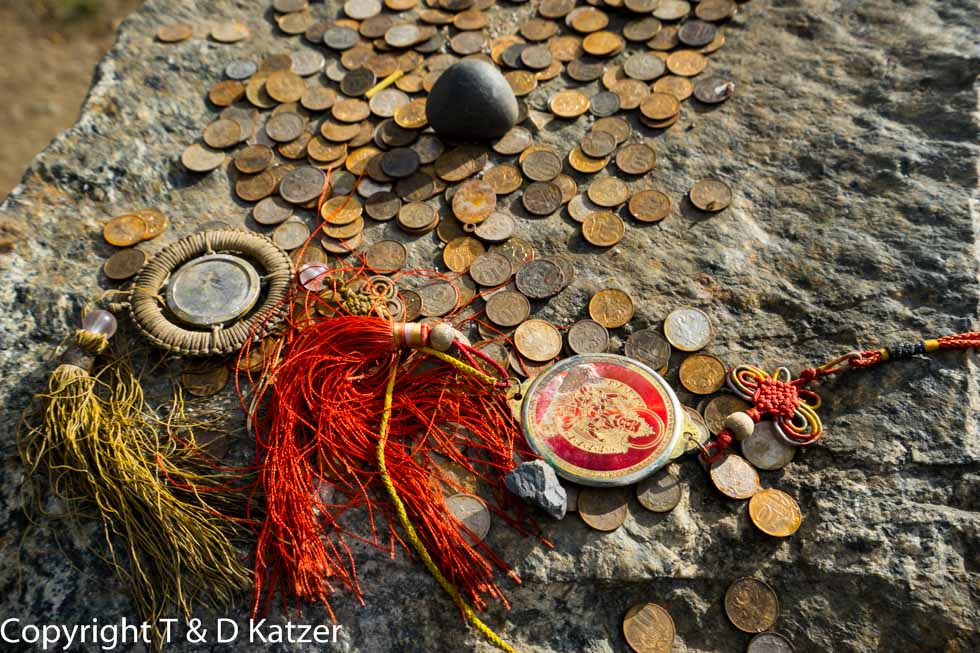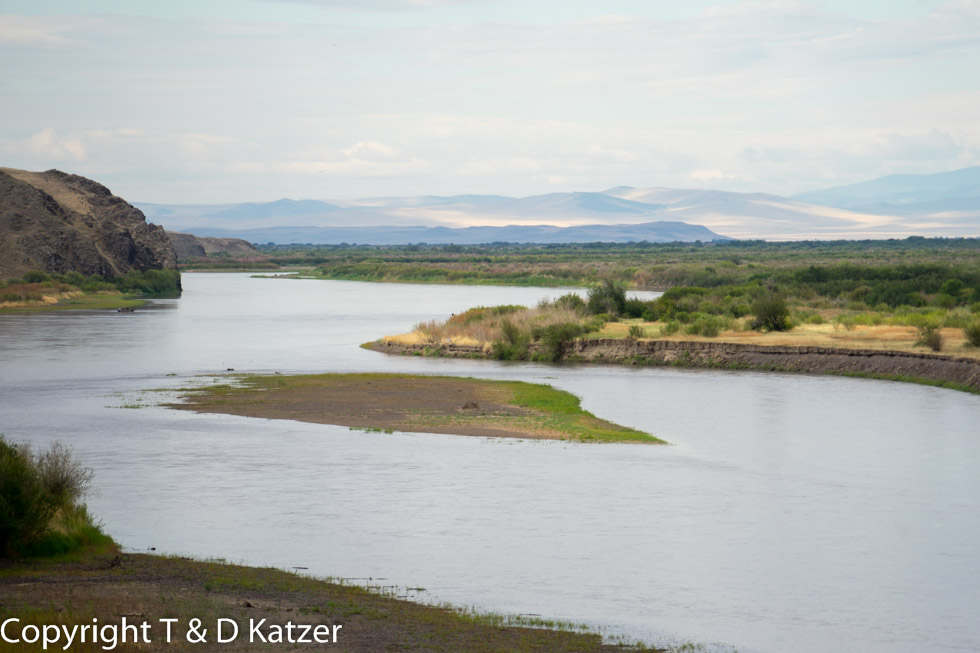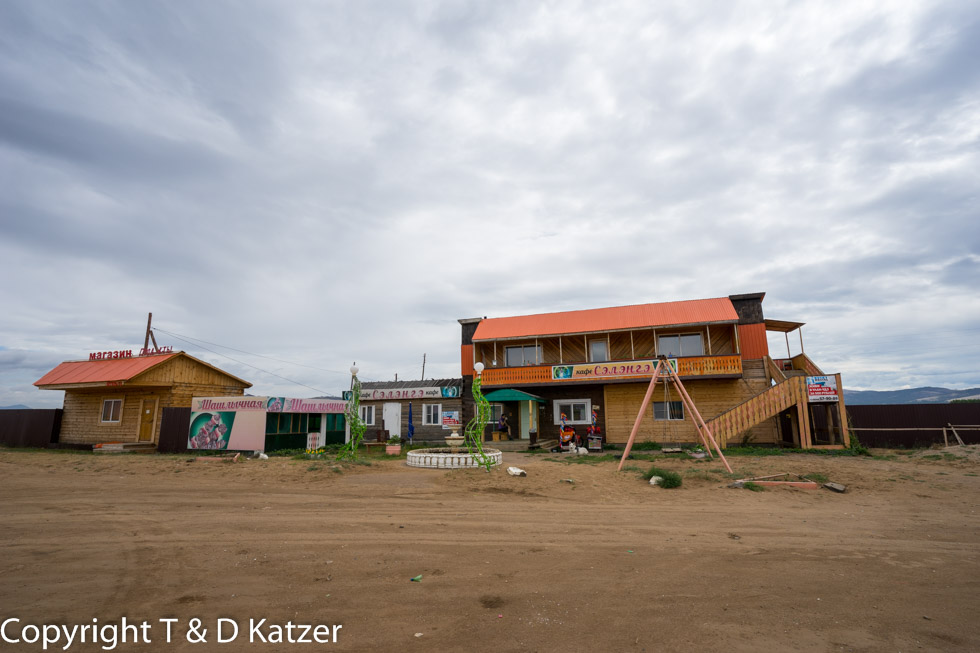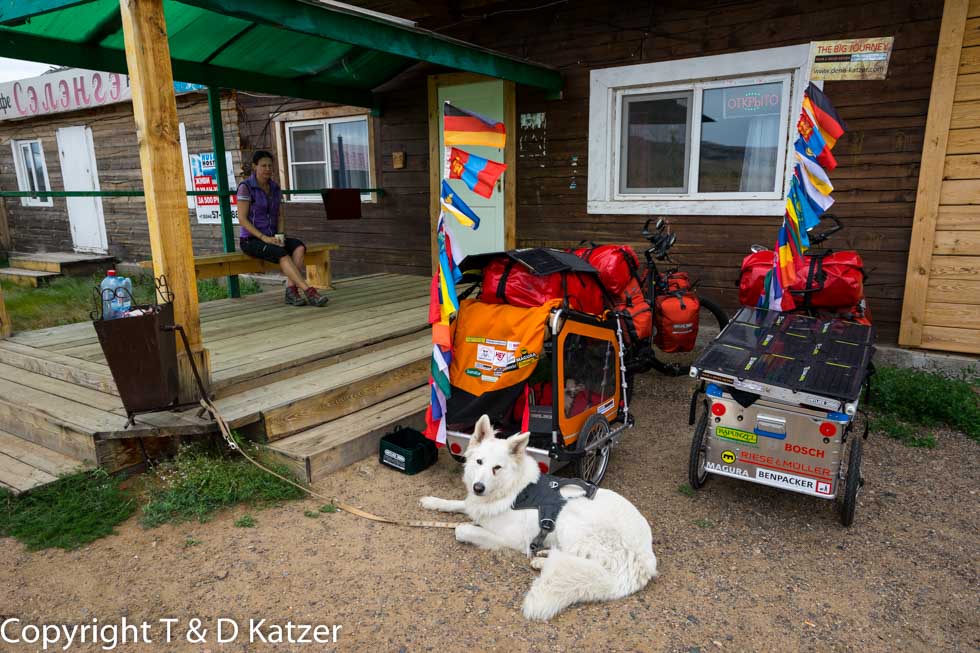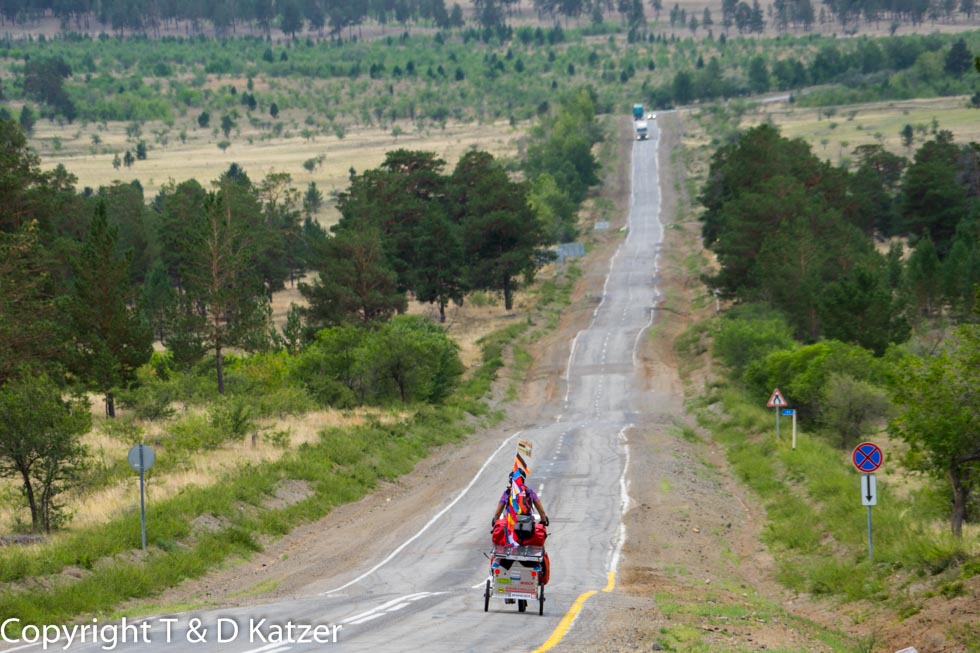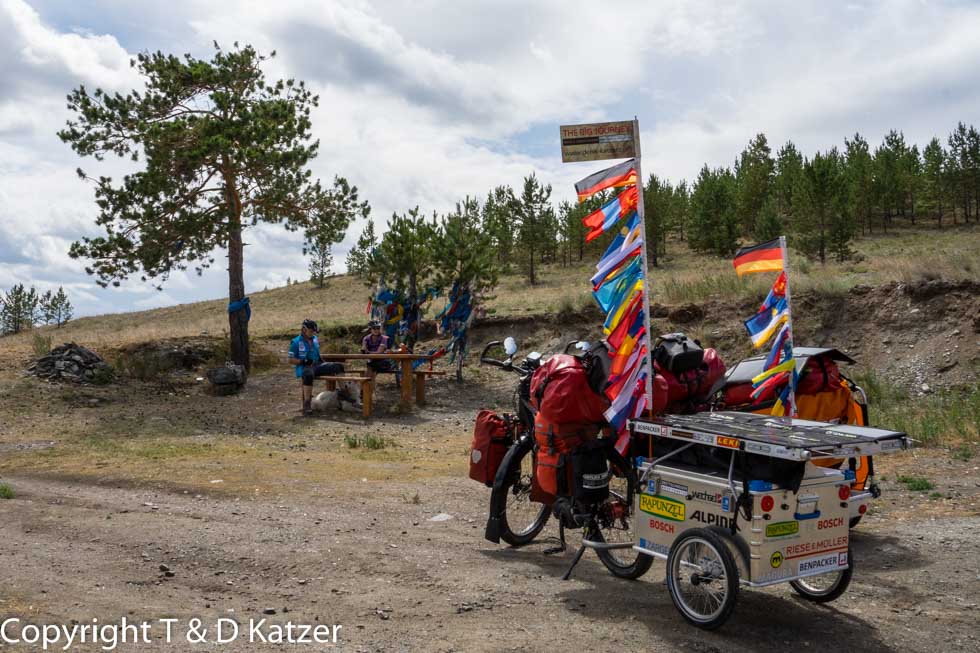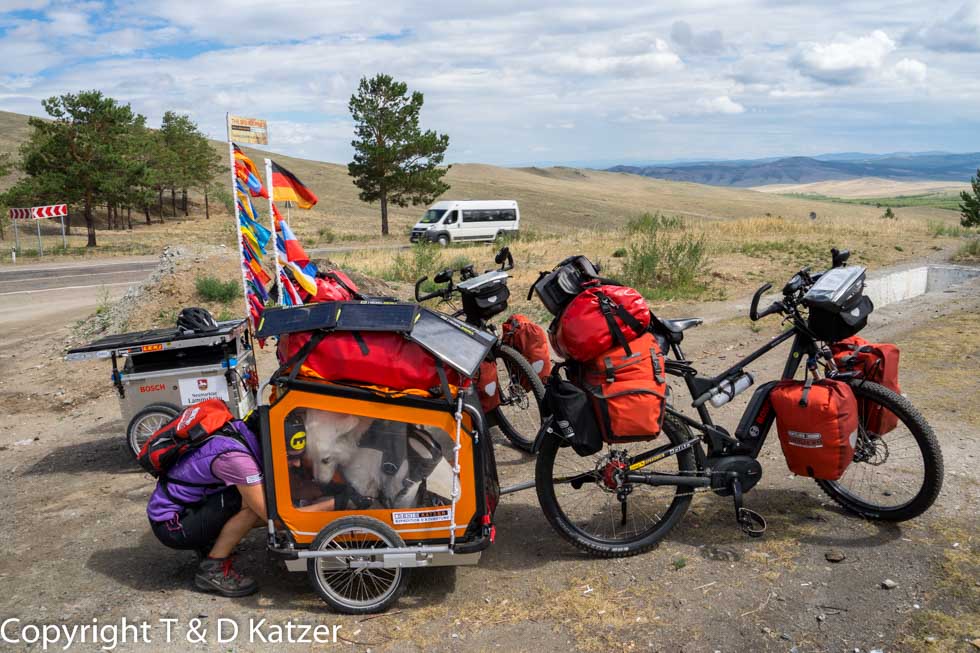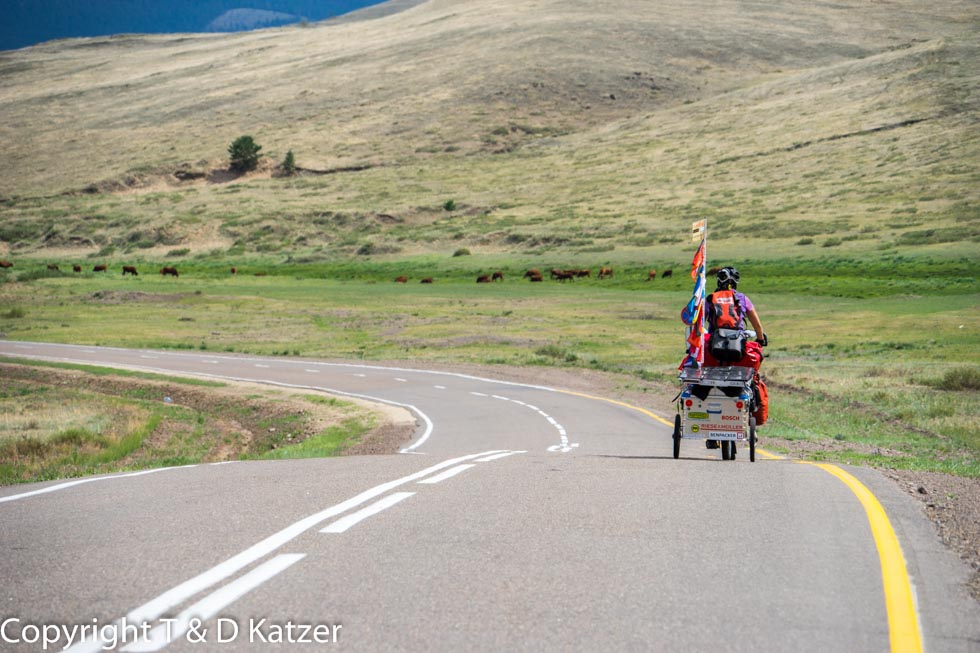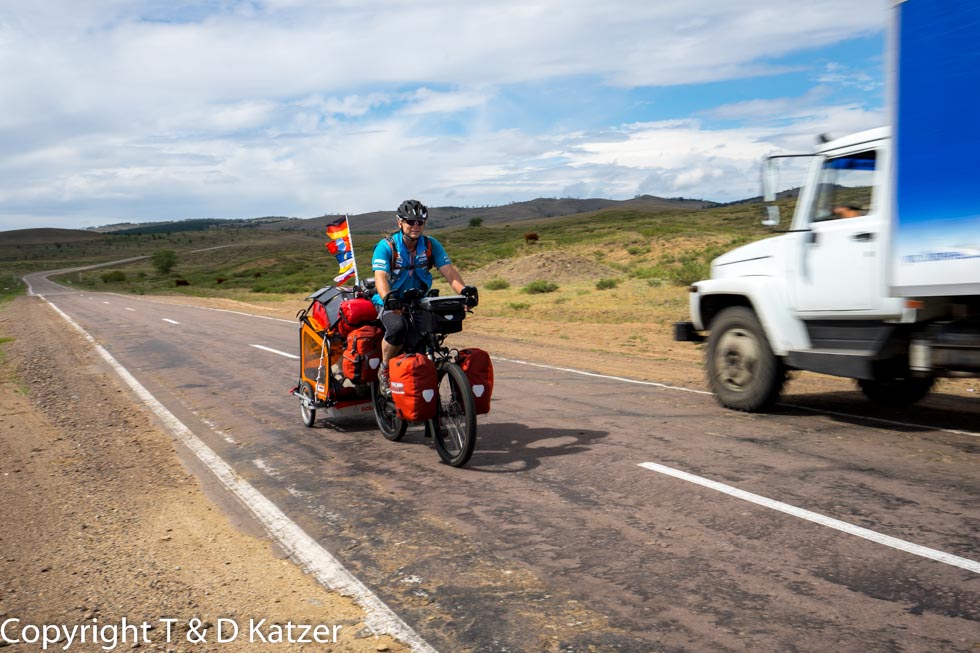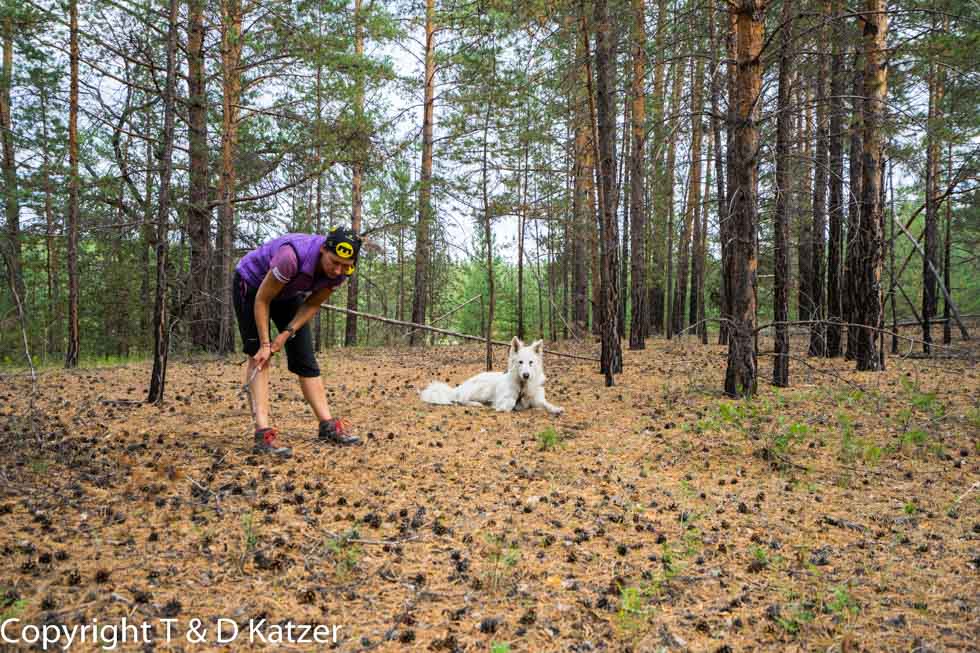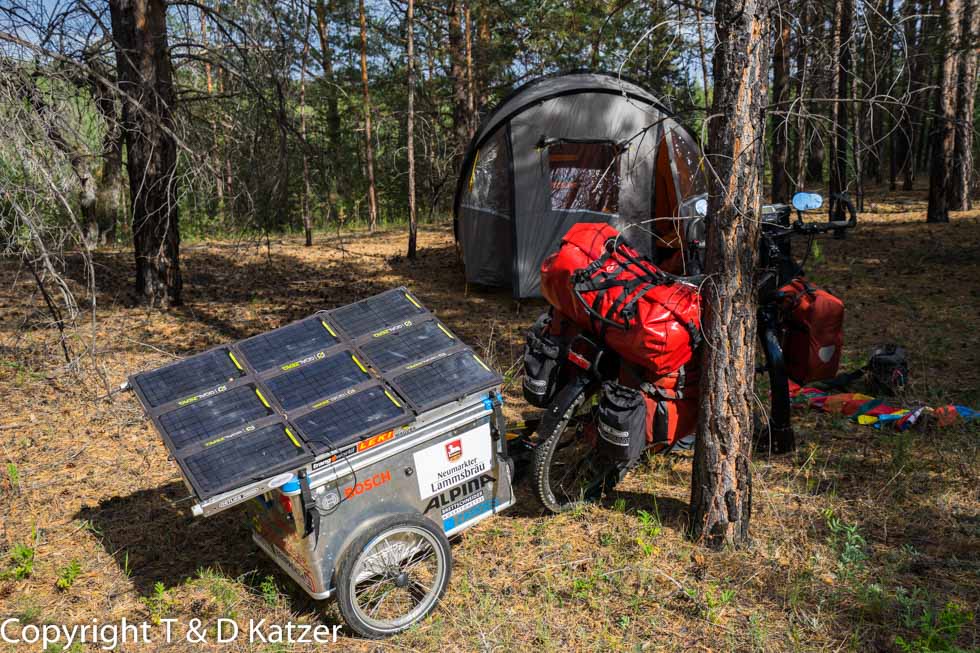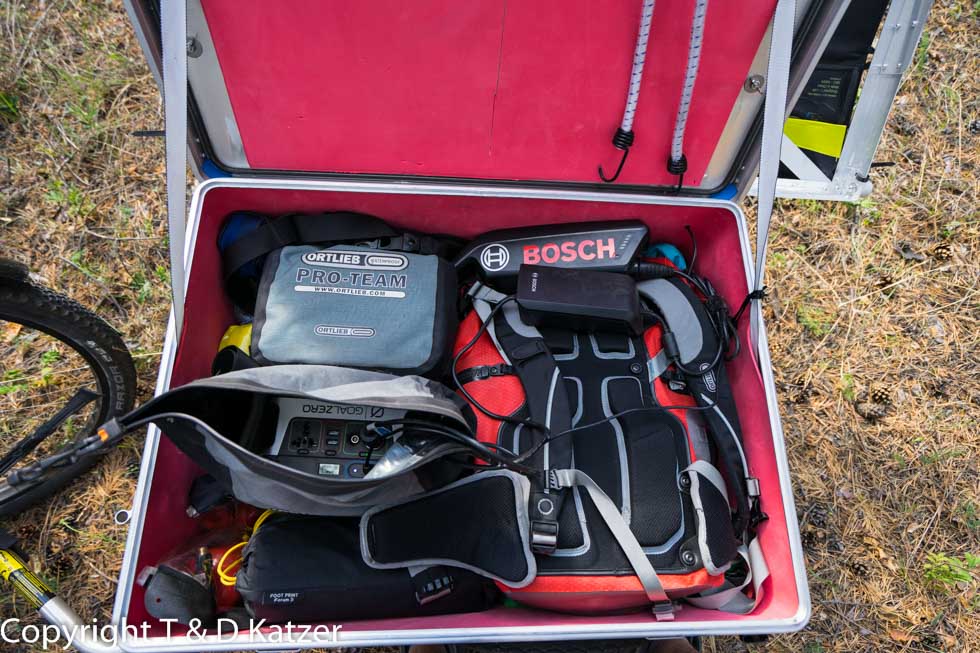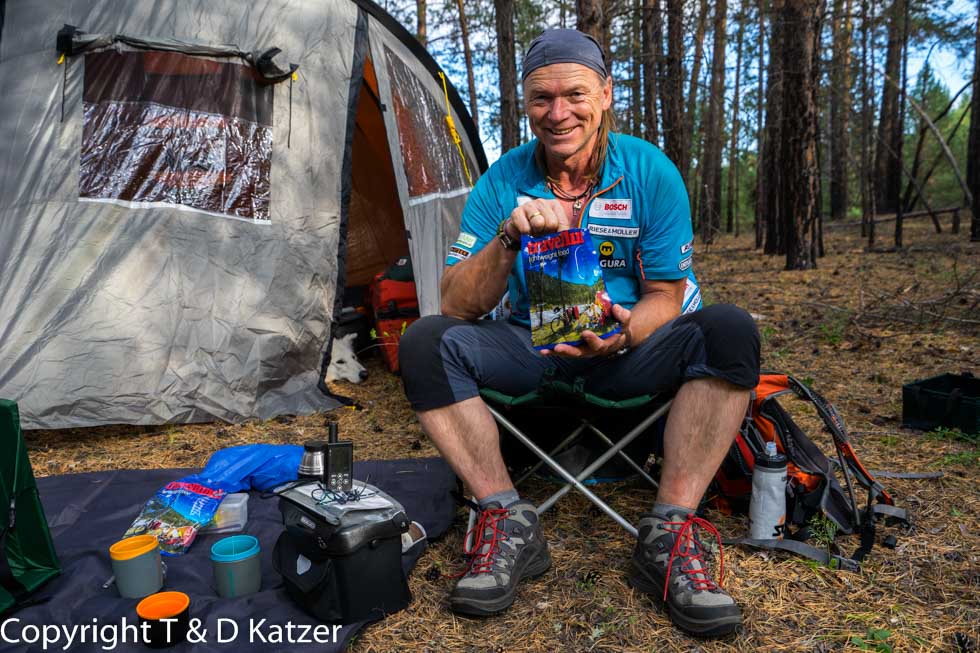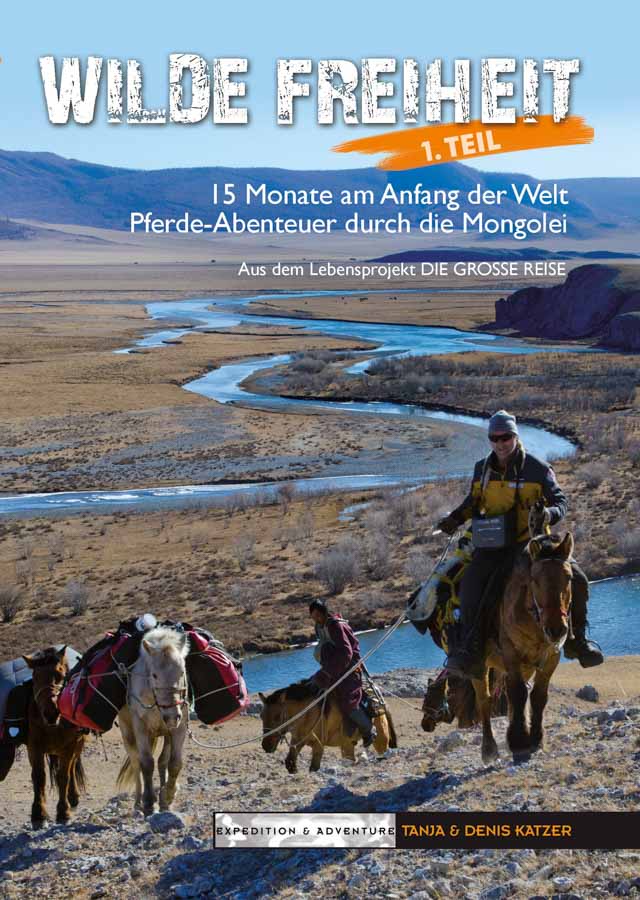
Taiga Camp
N 50°37'57.0'' E 106°27'39.3''
Day: 27
Country:
Russia / Siberia
Location:
Taiga Camp
Latitude N:
50°37’57.0”
Longitude E:
106°27’39.3”
Daily kilometers:
85
Total kilometers:
8,254
Aver. Sib.
20, km/h
Soil condition:
Poor asphalt
Maximum height:
900 meters
Sunrise:
05:09 a.m.
Sunset:
8:51 pm
Travel time:
4:05 hrs.
Temperature day max:
30 °
Departure:
8:00 a.m.
Arrival time:
5:00 pm
(Photos of the diary entry can be found at the end of the text).
Despite the bad night, we get up at 4:00 am. Because we have missed a few hours of sleep, we are dog-tired. We eat some more breakfast from home and carry the equipment down from the fourth floor. As in the last few days, I take care of setting up the bike while Tanja empties Ajaci. Then the trailers have to be rolled out of the narrow door of the Gastiniza. The bikes must not be left unobserved for a second. So Tanja stays outside with Ajaci while I struggle to maneuver the trailers over the threshold and up the stairs. There is enough time to be approached by a few freshly awakened vodka oaks. A dog about four months old, who belongs to the Gastiniza, lives there under simple conditions in a completely run-down dog kennel but is loved and fed, jumps around us and wants to follow us. I grab the little creature and carry it back into the house. We get into the saddles and start pedaling. We leave the run-down settlement, which was only founded in 1939 because of the lignite deposits discovered in this region, behind us. The A165, which we will follow to the Mongolian border, leads us relatively steeply uphill for the first few meters. Before we reach the highest point of the pass, we stop briefly to take another look at the town, which lies directly on the shore of the lake of the same name. “That’s the Goose Lake after which the town was named,” I say, snapping a few photos. “Goose lake?” asks Tanja. Yes, that’s his name. Gussi is the Russian word for geese, I’ve read.”
The road winds up to about 900 meters. Tanja and I remember how we had to push our bikes for almost the entire ascent. Today, however, we switch the support level to Sport and ride uphill at 10 km/h to 15 km/h. “I can’t believe it,” I marvel as we reach the top, panting heavily but still with our strength. Because we are in Buryatia and the Buryats share their faith with the Mongols, we are soon greeted by an Ovol (sacrificial site) on every pass. Ovols are usually wooden trunks piled up like Indian tents with blue pieces of cloth and flags tied to them. The traveler who passes by here hangs such a piece of cloth in the wood and wishes himself and his companions a safe journey. If, like us, you don’t have any such pieces of cloth, you can also take a stone from the nearby area and pile it on the ovol with the other stones. You then have to circle the sacrificial site three times. This is believed to guarantee a safe journey. As this ovol is our first on the current journey, we also walk around it according to the old custom. “Where are you from?” a few visitors to the sacred site ask us. “What, from Germany?” they reply, to which we immediately recognize Mongolians by their accent. “You come from Mongolia?” asks Tanja. “Tijmee” (yes) they answer, delighted to be recognized. “Minij ner Tanja” (My name is Tanja), she says, to which the Mongolians respond with shouts of amazement and admiration. As we have spent almost two years in this country during our Great Journey, we immediately remember a few Mongolian words and phrases which we exchange amidst loud laughter. As soon as the Mongolians have said goodbye, Tanja is addressed by a Kazakh in Russian. “I am a tourist and live in Almaty. Do you know this city?” “No, but we visited the city of Astana during our cycle tour through Kazakhstan. It’s a beautiful place,” says Tanja, whereupon we immediately found a common denominator to have a little chat. We say goodbye to the friendly Kazakh because we still have quite a long way to go today. As soon as we are on the road, he and a second man follow us in a large off-road vehicle, stop, get out, reach into his rucksack and hand us a bottle of mineral water, a large bag of almonds and an equally large bag of pistachios. “Take this, please. So you have something to eat on the way,” he says with a laugh. Before we can answer properly, he gets back into his car and drives off, waving. “There they are again, the hospitable and generous Kazakhs,” I say in amazement. Of all the countries we have traveled to in the last 25 years, Pakistan and Kazakhstan are among the most hospitable. We have often been given gifts in this way by complete strangers. It was not uncommon for us to be invited, cooked for and treated like princes. We look after the ever-shrinking jeep and are delighted with the generous gift. There are wonderful people on this planet.
“Should we put on a vest for the descent?” Tanja ponders. As it is relatively fresh up here at over 900 meters and we don’t know how long it will take to get down, we put on our vests and immediately glide down into the valley. A descent that we will certainly never forget. The route descends a gentle gradient for a total of 17 kilometers. 17 kilometers is an almost divine gift for a cyclist without an electric drive, but such a descent is also an extraordinary gift for us. “Whoopee! Whoo-hoo! Whoo-hoo!”, Tanja can be heard behind me cheering and whooping. Once at the bottom, we wonder why we couldn’t remember this fun. “Do you remember the headwind we had back then? It was so strong that we sometimes had to pedal downhill ourselves,” I remember.
Since we left the town on Lake Gänsesee behind us, there has hardly been any traffic. Driving through the picturesque landscape has become an absolute pleasure. We leave the town of Novoselenginsk on the side of the road, remembering that we had to cover many kilometers over rough gravel in this area, had a bad flat tire and were forced to cover long distances that were far beyond our strength because of an expiring visa. “It’s really crazy. You can travel the same route under similar conditions and experience completely different stories,” I say and am happy to have got through so well this time. Then we cross the Selenge, which has its source in Mongolia. At 1024 km, it is the longest and most water-rich tributary of Lake Baikal. We stop on the bridge over the river, which we have already crossed several times with our horses in Mongolia to get to the reindeer nomads. It’s a feeling that can hardly be described, because the selenium brings back memories of our Mongolia expedition, which Tanja likes to describe as a thousand and one night stories of a foreign world.
We ask in vain for accommodation at a small roadside restaurant. “The next place to stay is in the town of Kjachta,” the landlady tells us. “If we want to make it, we have to cover 130 kilometers over the asphalt today. It’s going to be tough and I don’t think we’ll have enough batteries until then,” I think. “Should we pitch our tent here to make the remaining 95 km to the border town tomorrow?” asks Tanja. “Here next to the roadside restaurant? I don’t think that’s a good idea. Let’s charge the batteries and see how far we can make it today,” I suggest and ask the owner of the pub if we can use her power socket. “Moschna”, (they are allowed to) is the answer and in return we fill our bellies with their delicious dishes.
In the late afternoon, we again emptied one and a half batteries. The mountains, which are constantly over 800 meters high, are extremely energy-hungry. In a small village we find an even smaller store where there is hardly anything to buy. Tanja buys a five-liter water container. We divide the precious liquid between our drinking backpacks and then put the half-full container in the trailer with Ajachi. “You need to make yourself a little smaller, my friend. We look old without water. That goes for you too, you little Sapperschlurch,” I say, giving him a quick graze behind the ears, which earns me a friendly whimper. “We should have connected the two empty batteries to the charging batteries,” I think briefly before driving on. “Why? Do you think we won’t make it to Kjachta with our batteries?” “We’re running out. We should use the remaining sunlight and connect the batteries to the solar cells straight away,” I decide. Then we pedal on. We have now covered 80 km across the mountain landscape. We are dog-tired again. My concentration wanes. This is the moment when you shouldn’t make any mistakes, when you shouldn’t stumble and have a firm grip on the handlebars. Our watchful eyes are glued to the cracked asphalt with its countless holes and bumps. Just behind the little village with its small Russian wooden houses and fenced gardens, I let my gaze wander over the landscape. “We have to look for a place to camp?” it calls behind me. “My turn!” I reply. Five kilometers further on I find a promising piece of forest. We put the bikes on the stand and while my two guard everything, I walk in with my thighs inflated and scan every meter with an experienced camp look. I walk alongside the path leading into the taiga so as not to leave any tracks. Then I discover a clearing about 100 meters from the road. Suddenly something moves. I freeze like ice and look in that direction. Wasn’t there something? A while later, it moves again. It is large and black. The first thought is a bear. My breath stops for a moment. A horse? Is it a horse? Suddenly the black stallion spotted me. He jerks his head in my direction. Then the proud animal gallops into the undergrowth with its mane flowing and disappears. “A good place,” I say quietly and quickly run back to Tanja. We bide our time until no more cars or trucks pass by, then we push our wheeled possessions into the forest as quickly as possible and disappear from the road. “And do you like the place?” I ask, a little proud to have discovered such an idyllic spot for us. “Malaze”, (fantastic) Tanja replies with a liberated laugh. We clean the ground of the spruce cones and set up our wonderful tent for the first time on this trip. Here in the wilderness, you see everything with completely different eyes. I thought the fabric hut was okay when I tried it out in our small garden at home. Here I have more of a feeling that it is a small palace. “We’ve never had such a beautiful tent. You can even stand in it. Ideal for me to record our experiences. And look at all the beautiful compartments. You can put anything you want in there,” I say, happy as a child. After spending over two years at home for the first time during our big trip, the moment we set up camp in the taiga is like arriving in the real home, the home of our hearts.
Tanja quickly boiled hot water on our stove for tea and a freeze-dried ready-to-eat meal. We sit on a tarpaulin in front of our tent and enjoy the evening atmosphere. A few rays of sunlight blink through the branches with their golden light. Ajaci lies at our feet and occasionally makes soft grunts of satisfaction. As Tanja retires to her sleeping mat to recover from the long day’s exertions, I sit in my camp chair and write these lines. The sounds of the forest at night awaken. They are new to Ajaci. He lifts his head and looks curiously in the direction they are coming from. At first I was worried he might give away our location with his barking, but he doesn’t make a sound. “You’re a great dog. I’m sure you’ll become a real expedition dog like your predecessor Rufus. He was a real hero. A hero who crossed the whole of Australia and could ride camels like no other.
The live coverage is supported by the companies Gesat GmbH: www.gesat.com and roda computer GmbH www.roda-computer.com The satellite telephone Explorer 300 from Gesat and the rugged notebook Pegasus RP9 from Roda are the pillars of the transmission.
